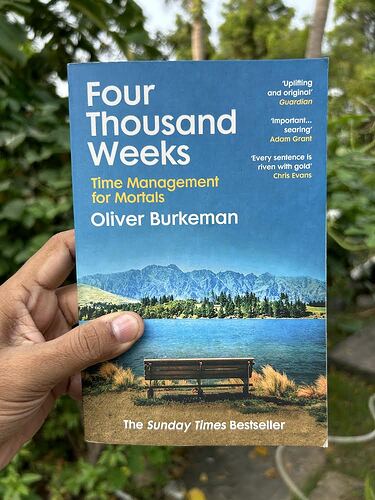@Girish_K – I only read physical books. I am too attached to paper and print to be holding plastic. Each book has a character in its cover page, art, age, smell of the pulp, typeface and weight and I wouldn’t want to change that. For me reading is bit more than just the text and the ideas. I do see why e-books could be convenient for others though. I see there are sources that offer free copy of every book imaginable and it would so economical for someone starting out. The ability to carry all the books you own is a big plus as well but that’s not important for me. I can carry 3-4 books on a long trip and read just 10 pages in one book and not feel awful for having been inefficient.
@Deven – I do use YouTube a lot these days as I am pursuing blues and jazz guitar. There’s a phenomenal amount of free content to grow on any and every topic. My son is learning Unreal Engine 5 and Blender and has made so much progress from just YouTube. We live in truly phenomenal times. I dont however subscribe to any YouTube channel as I look for specific things and it could be from anyone – so no favourites as such.
@Mudit.Kushalvardhan – I have noticed my heart rate is lowest when I read. I see it hovering 54-60 most times with a book, so you might be onto something.
@pahaaadi – Armed with well-highlighted book and Notion, I go page by page, chapter by chapter and re-read all highlights and sections around it and summarise it in my own words. It takes 20% of the time it took to read the book on average, sometimes less. I consistently go back to my notes whenever I visit this thread (so easy to scroll and land on something) and re-read. This is how I collect the dividends on my investment.
Four Thousand Weeks, Oliver Burkeman, 2021 – The title of the book stands for the number of weeks we have at our disposal, should we live to 80. So this of course, is a time management book (not to be mistaken for a productivity enhancement book). These 4000 weeks don’t flow uniformly – slow at first, they speed up towards the end. Keeping with the Joneses and finding new Joneses to keep with up, negates any and all improvements in productivity. You will never work less.
Time in industrial era, is broken into chunks, sold to others with tasks lined up to fill them with no scope for the natural rhythm of life to take over. The clock does not stop, but we can choose to not hear it ticking by dissolving the boundary that separates self from reality (through prayer and meditation) and experience a deep, timeless time. Time and life are not separate – separating it causes stress of not using it well or of wasting it. A well lived life is just well-spent time. By attempting to master time, we let time master us. Meaningful productivity gains come from letting tasks take the time they take.
It is impossible for us to experience everything that life offers us. We must make peace with our decision to pursue limited choices and stop clearing the deck for more and cultivate the attitude of ‘joy of missing out’. Choose 3 top priorities and procrastinate on the rest – let the middling priorities be. What you pay attention to, will define your life. Beware of persuasive design and the attention economy (distraction from distraction by distraction) that makes ill-crafted real-life experience a chore. Willpower stands no chance in the attention economy (So avoid exposure).
Don’t plan. Activities resist our plans. While planning may forestall a catastrophe, we feel anxious and worry in the present. We must avoid wandering in times that are not ours (the future) and let the mind handle whatever happens. Respond to the best of your abilities should bad things occur.
Your time-off needn’t be an investment in your future personal growth. Leisure is for self-reflection and philosophical contemplation and for pursuing hobbies with no apparent payoffs. A good hobby should feel little embarrassing and it’s fine, even preferable to be mediocre in them. Have a flexible schedule and don’t hoard your time – share it.
A lot of the stuff in the book is what I already believe in so I did not find anything earth-shatteringly new. It might be borderline offensive to people pursuing productivity hacks and to people who are poor and want to make something of their lives. This is a book a middle-aged man in the first world who has some savings put away would write, for other such middle-aged men of the world. 8/10
| Subscribe To Our Free Newsletter |


